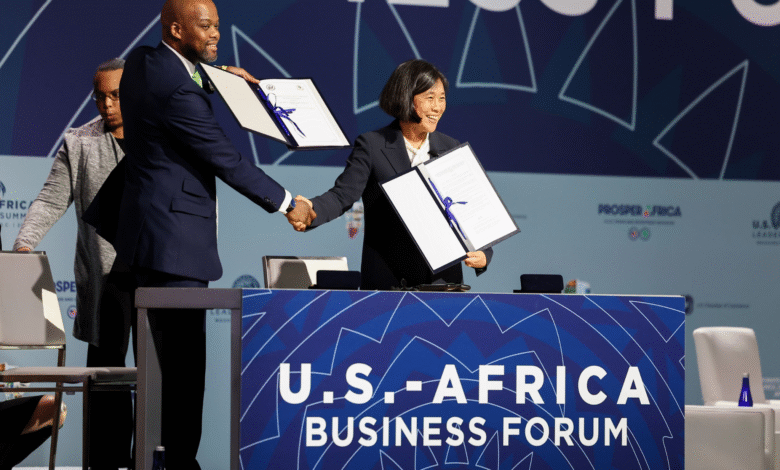U.S.–Africa Relations : a new economic era following the 2025 U.S.–Africa Business Summit
From June 22 to 25, 2025, Luanda, Angola hosted the 17th U.S.–Africa Business Summit, drawing a record attendance of over 2,700 public and private sector leaders from both continents, including 12 African Heads of State. Organized by the Corporate Council on Africa and the Angolan President, this landmark event resulted in over $2.5 billion in commercial deals and strategic commitments, signaling a profound shift in U.S.–Africa economic relations.

This summit comes amid a significant transformation in U.S. policy toward Africa. The Trump administration notably dismantled USAID (United States Agency for International Development) and raised tariffs on certain African imports, reflecting a decisive move away from traditional development aid toward a trade and investment-focused strategy.
Solidify cooperation based on shared economic interests
The U.S. delegation, led by Ambassador Troy Fitrell, Senior Bureau Official for African Affairs, included senior officials responsible for trade diplomacy and investment development such as Massad Boulos, Thomas Hardy, Constance Hamilton, Connor Coleman, and Tamara Maxwell, underscoring the intent to solidify cooperation based on shared economic interests.

Agreements cover various sectors. For example, Amer-Con Corporation partnered with Angola’s Cargo and Logistics Certification Regulatory Agency to build and operate 22 grain silo terminals along the Lobito corridor, backed by the U.S. Export-Import Bank to boost Angola’s food security and agri-logistics. Technology was highlighted by Cybastion’s $170 million investment in Angola’s digital infrastructure and cybersecurity.
Energy projects feature prominently, including a U.S.-backed LNG terminal in Sierra Leone by CEC Africa and AG&P, a $760 million hydropower project spanning Rwanda and DRC involving Ruzizi III Holding and Anzana Electric Group, and a $1.5 billion transmission line connecting Angolan hydropower sites to key mines in the Democratic Republic of Congo.
Tourism investments also emerged, with Ethiopia Investment Holdings and U.S. International Finance Partners agreeing on over $200 million to develop luxury hotels and branded residences, aligning with Ethiopian President Taye Atske Selassie’s development priorities.
This strategic shift carries significant implications. With U.S. official development assistance sharply reduced since 2017, the new approach prioritizes sustainable economic growth through trade. Yet, it draws mixed reactions. Some African experts warn of a “sudden pivot” that could leave vulnerable populations at risk, while others praise a pragmatic focus on job creation and infrastructure development.
This summit marks a key step toward transforming our engagement into a win-win cooperation

Ambassador Fitrell stated, “Africa and the United States are now equal partners in an economic relationship built on mutual interests. This summit marks a key step toward transforming our engagement into a win-win cooperation.” Senior Advisor Massad Boulos added, “We are moving from aid to investment, essential to building a prosperous and integrated Africa.”
Prioritizing U.S. companies and private investments also fits a geopolitical strategy to counterbalance China’s growing influence on the continent, which remains a dominant player through massive infrastructure projects and loans.
On the ground, this strategy requires African states to adapt by improving regulatory environments, fighting corruption, modernizing infrastructure, and strengthening local capacities to attract foreign investment.
The era of generous but often criticized aid is yielding to an economic partnership grounded in trade, strategic alliances, and active commercial diplomacy
In conclusion, the 2025 U.S.–Africa Business Summit marks a major turning point in relations between Washington and Africa. The era of generous but often criticized aid is yielding to an economic partnership grounded in trade, strategic alliances, and active commercial diplomacy. If managed well, this new dynamic could foster more autonomous, sustainable, and mutually beneficial development. However, caution is necessary to ensure that commercial interests do not exacerbate social inequalities or marginalize vulnerable African populations.






